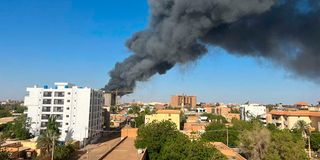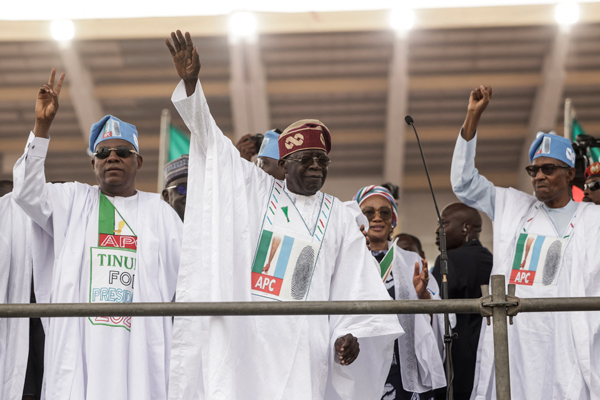Without elected government, Sudan will have no peace

A column of smoke rises behind buildings near the airport area in Khartoum on April 19, 2023, amid fighting between the army and paramilitaries following the collapse of a 24-hour truce.
Projecting how the Sudanese crisis will play out does not require rocket science. The army will prevail. The opposing Rapid Support Forces (RSF) may be heavily armed and trained in the ways of militia combat, but there’s no chance they’ll overcome the sheer firepower of the Sudanese armed forces. The army has the advantage in numbers too — 109,000 men. The RSF has about 70,000.
The issue now is whether the conflict will be prolonged, or whether a peace deal will be struck soon to end it. So far there’s no sign of that. Both sides have dug in. The proposed three-day Idd el-Fitr (Friday) ceasefire collapsed almost immediately.
The crux of Sudan’s current problems lies in the pangs of post-dictatorship. Sudan has yet to transition properly to democracy since the 2019 military coup against the three-decade autocratic rule of Omar el-Bashir.
The protagonists in the latest fighting — Generals Abdel Fattah al-Burhan and Mohamed Hamdan Dagole alias Hemedti — were key in Bashir’s ouster. But what they did was hijack a popular mass uprising and turn it around to their own ends.
They joined hands again to stage a second coup in 2021 whose net result was to postpone progress towards a return to civilian rule.
When Bashir was overthrown, an interim joint military-civilian administration had been set up to run the country, on the understanding that a democratic civilian government was the endgame. The military used the excuse of wrangling among the civilians to execute a coup. Civilian Prime Minister Abdallah Hamdok was booted out. He had dared, against the military’s wishes, to privatise its varied commercial interests.
Burhan, as army chief, headed the new junta. Hemedti was deputy, yet always his own man. His power base has been the RSF, a paramilitary formation that grew out of the Janjaweed militia Bashir had deployed in the Darfur region.
The Janjaweed's violence brought upon Bashir an indictment for genocide from the International Criminal Court in 2010, though up to today the Sudanese authorities have refused to act on the ICC warrant.
Although initially allies, Burhan’s and Hemedti’s relationship were deeply distrustful. It got outright hostile in the countdown to the implementation of the so-called Political Framework Agreement, the negotiated roadmap to civilian rule. The stumbling block was the vexed issue of integrating the RSF into the army.
Hemedti doesn’t fancy coming under the army, so he has fought the plan. Matters came to a head last month when Hemedti loudly demanded the speeding up of the handover of power to civilians, a process he accused the army of stalling.
Those familiar with the Sudanese power game immediately understood what Hemedti was up to. He was playing to the gallery. Portraying himself as pro-people and the army as the opposite was intended to give him street credibility in his rivalry with Burhan.
Wolf in sheep’s skin
However, the pro-democracy forces know him very well as a wolf in sheep’s skin. The Forces of Freedom and Change (FFC), a coalition of Sudanese civilian pressure groups that were instrumental in Bashir's removal, has clarified that it is not in cahoots with Hemedti in any way, citing the RSF's record of atrocities against civilians. “There's no alliance,” FFC Council member Khalid Omer said with finality.
Framing the conflict between the army and the RSF as one between the forces of dictatorship and those of democratic transformation suits Hemedti fine. However, that’s a false parallel when everybody knows what is happening is basically a power struggle between two warlords.
Certainly, Hemedti is no Democrat. If anything, Hemedti is a consummate opportunist. He is trying his best to discredit the army as an institution infested with Islamist extremists. To an extent that is true. Yet the RSF itself was never a secularist haven. Its history and links with radical Islamist elements in the Bashir regime are well known.
Nevertheless, Hemedti has cultivated useful connections abroad. He inserted RSF fighters into the Yemeni war on the side of pro-Saudi and pro-UAE soldiers, hence gaining the goodwill of both countries. He is also a frequent visitor to Moscow where he has friends. Still, Burhan holds the foreign card that really counts. He retains the confidence of Egypt, the ultimate hegemon in Sudan.
The present-day battlelines are clear. Burhan has ordered the dissolution of the RSF. Of course, the order has gone unheeded. Yet this much cannot be disputed: every country has a right to have its own genuine national army. It is legitimate.
The question is whether an irregular, unregulated militia that is not accountable to any higher authority should be allowed to paralyse a country. Truth is, until the problem of a non-representative government is resolved, Sudan will remain in permanent crisis.
Predictably, the UN Security Council, the African Union, the Arab League and Igad (the regional body) have been beavering away at seeking a diplomatic solution.
Meanwhile, Burhan and Hemedti refuse to call a truce. They also adamantly refuse to dialogue. Perhaps a diplomatic way out will be found. If not, Sudan could sink into civil war. It has been there before.





